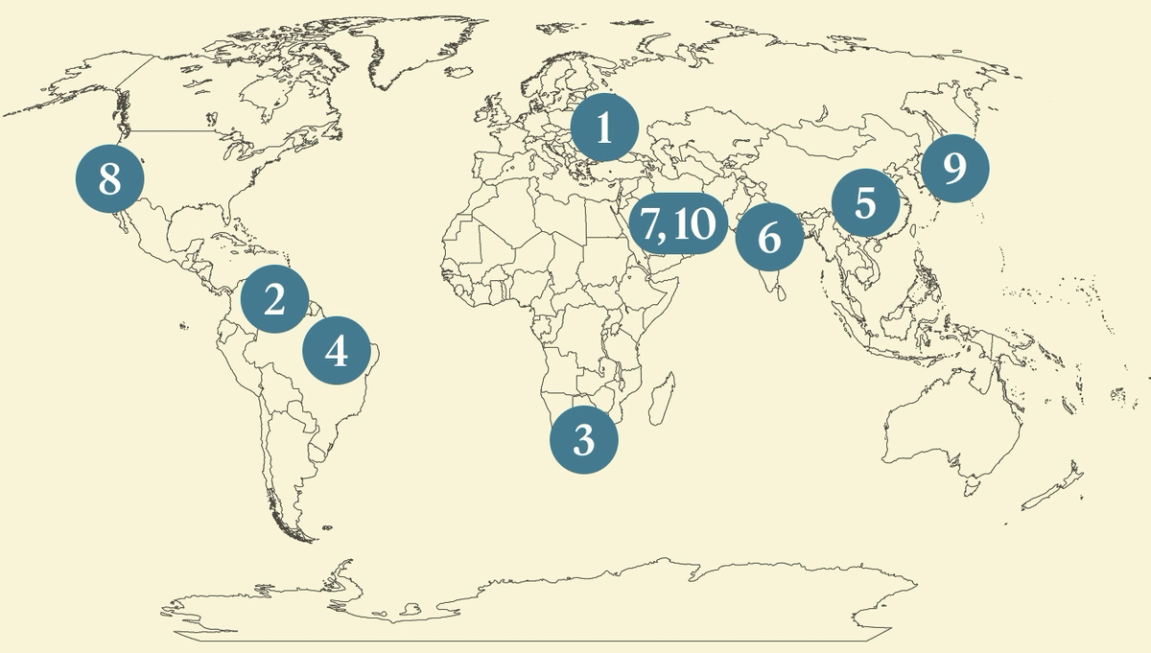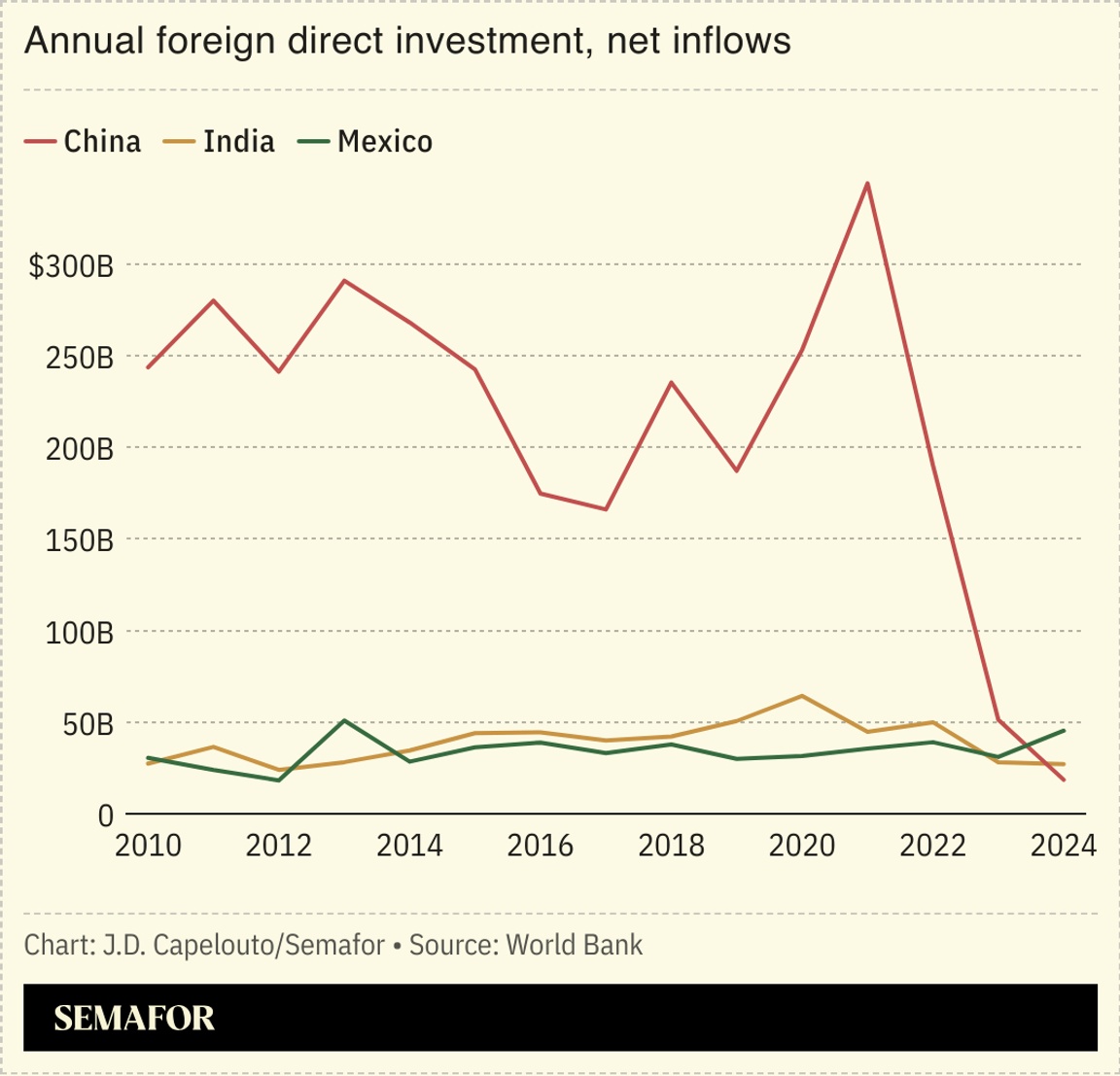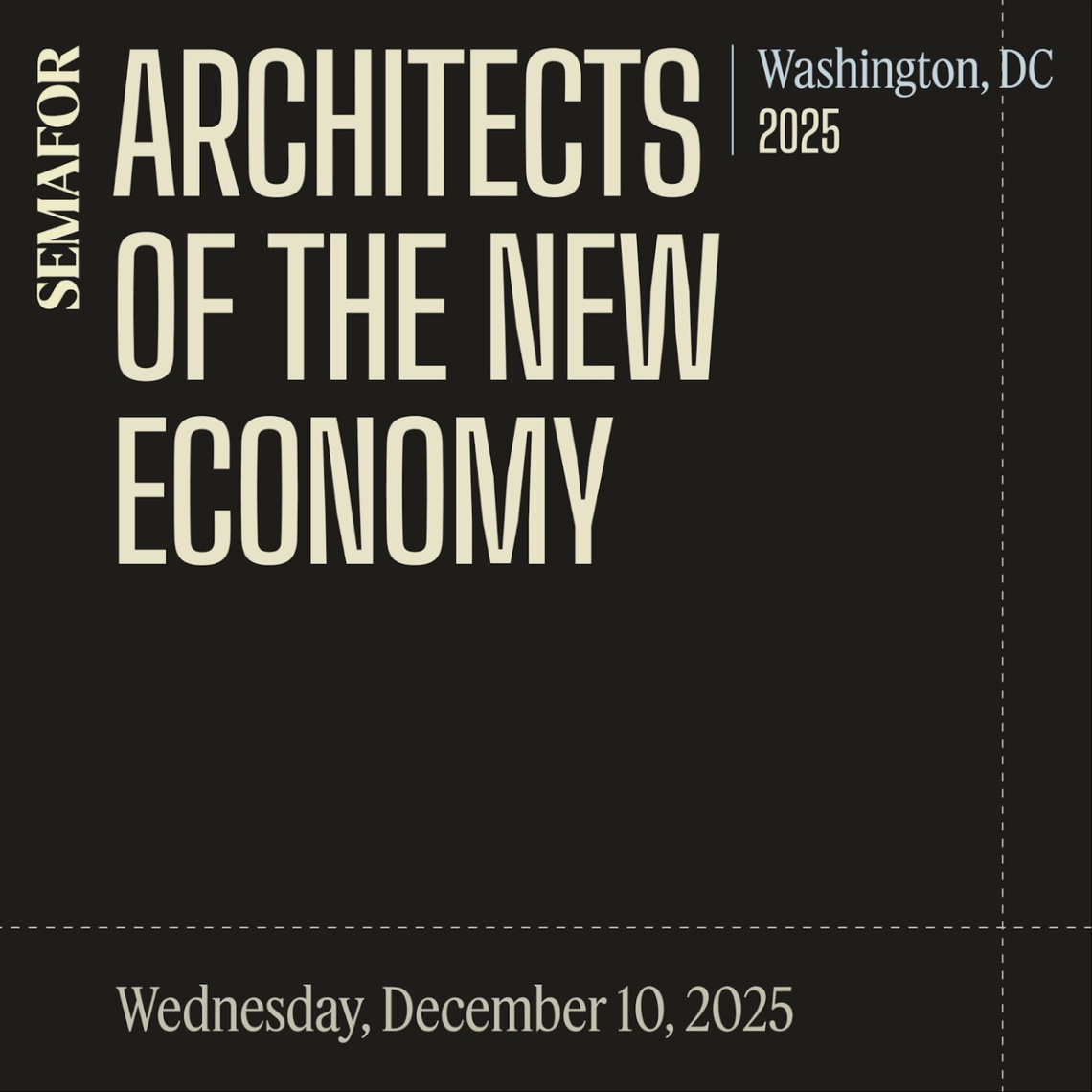| | US officials meet with their Ukrainian counterparts to discuss a new peace proposal, the G20 and COP͏ ͏ ͏ ͏ ͏ ͏ |
| |  | Flagship |  |
| |
|
The World Today |  - US advances Ukraine talks
- Venezuela, US tensions rise
- G20 cheers multilateralism
- COP30 ends with a shrug
- Western biz open to China
- Foreign banks look to India
- Indian fighter jet crashes
- Google’s robotics push
- Japan’s migration experiment
- Saudi’s changing alcohol rules
 A Frida Kahlo painting fetches a record price at auction. |
|
US looks to advance Ukraine peace deal |
 Emma Farge/Reuters Emma Farge/ReutersTop US officials flew to Europe on Sunday to advance a Ukraine peace plan that faced criticism for its tilt toward Russian interests. The Geneva talks involving American, European, and Ukrainian leaders come after US officials and lawmakers sparred over who authored the 28-point, Washington-backed plan. The confusion suggested “foreign nations now have to deal with rival factions of the US government who keep major policy initiatives secret from each other… as the succession battle for 2028 begins,” The Wall Street Journal’s foreign affairs correspondent wrote, summing up one diplomat’s assessment. Even as President Donald Trump has pushed Kyiv to accept the deal by Thanksgiving, the negotiations remain flexible, The Washington Post’s David Ignatius reported, so Kyiv faces an “agonizing choice.” |
|
Washington ramps up Venezuela pressure |
 Petty Officer 1st Class Jerome Johnson/U.S. Navy/Handout via Reuters Petty Officer 1st Class Jerome Johnson/U.S. Navy/Handout via ReutersThe US is reportedly considering expanded military operations against Venezuela, as it ratchets up its presence in the Caribbean. Washington has pursued a military buildup around the South American nation following strikes against alleged drug boats; several airlines halted flights to Venezuela after the US warned of “heightened military activity” around its airspace. The Donald Trump administration is mulling options including attempting to overthrow Venezuelan President Nicolás Maduro, Reuters reported. It’s unclear how the volatile Ukraine talks may connect to the escalation against Caracas, a Russian ally and major focus for US Secretary of State Marco Rubio, who is also involved in Kyiv-Moscow peace negotiations. The outcome of the twin crises could shape Rubio’s political future, analysts said. |
|
G20 argues for multilateralism |
 Marco Longari/Pool via Reuters Marco Longari/Pool via ReutersGlobal leaders at the G20 summit looked to chart a path forward for a world order shaped by US retrenchment. Washington’s absence loomed large at the gathering in South Africa, where Canada’s prime minister said that the world would move on without the US and that “the center of gravity in the global economy is shifting.” South Africa cast the G20 as a win for multilateralism on Saturday after leaders agreed to a declaration that Washington opposed. Still, some cracks emerged, pointing to the US’ substantial influence: Western leaders scrambled to formulate a response to the US-backed peace plan for Ukraine, while sub-groupings of countries clustered to pursue their own priorities, Bloomberg noted. “The world is reorganizing itself,” Germany’s chancellor said. |
|
COP30 falls short of ambitious climate deal |
 Adriano Machado/Reuters Adriano Machado/ReutersThe COP30 climate summit in Brazil concluded without an explicit new international mandate to drive the global transition away from fossil fuels. The gathering still managed to piece together a patchwork of alternative solutions, prompting at least some negotiators to call the talks a success: “I would always love more,” the UK climate envoy said. “But… in the current geopolitical environment, this is a big victory.” COP leaders had promised to focus on “implementation.” Instead, the conference mostly delivered “more plans to make plans,” Semafor’s climate and energy editor wrote. Still, that the summit didn’t regress on previous commitments is “no small feat,” given the US’ absence from COP30 and general global turbulence. |
|
Western firms grow more open to China |
 Western companies are signaling a renewed eagerness toward doing business in China — or even expanding their footprint — despite lingering tensions, an economic slump, and the narrative of a decoupling. “The next China is China,” Estée Lauder’s CEO told the Financial Times, detailing plans to double down in the country despite the US makeup giant’s poor post-pandemic showing there. Even with Berlin’s “de-risking” push, China remains “an obvious place to do business” for German firms, which are pouring billions into the country, DW reported. Foreign companies are grappling with a slowdown in growth, government pressure, and geopolitical fault lines, but they should understand the Chinese economy is “not unraveling,” China Briefing wrote. “So far, we continue investing,” a JPMorgan vice chairman said. |
|
Global banks eye India’s growth |
 Niharika Kulkarni/Reuters Niharika Kulkarni/ReutersIndia’s banking sector has begun a “new chapter” as more global capital pours into the country, Mumbai-based analysts said. So far this year, the industry has attracted $8 billion in deals from companies in Dubai, Japan, and other nations, a steep increase from $2.3 billion last year. The boom reflects growing investor confidence in India’s economy as its banks post cleaner balance sheets. Regulators also plan to allow more foreign investment in state-run banks. As the country’s economic growth accelerates, foreign banks in places with aging populations see India as an attractive prospect, the Financial Times wrote. “There’s enough credit demand,” an investment banking CEO said. “Anyone who’s buying a bank in India is taking, I’m sure, a 50-year view.” |
|
Air show crash hurts Indian defense exports |
 Jingesh Variya via Reuters Jingesh Variya via ReutersAn Indian fighter jet crashed during an aerial display at the Dubai Air Show, killing the pilot and dealing a blow to New Delhi’s goal of becoming a defense export powerhouse. The explosion in front of global arms buyers likely leaves India reliant on its own military for orders of the Tejas jet, Reuters wrote. “The imagery is brutal,” the head of a US aerospace-focused think tank said. India and its archrival, Pakistan, jockeyed for influence throughout the weeklong event, held six months after their brief clash, which featured the world’s largest air battle in decades. The Pakistani contingent touted a fighter it co-developed with China that was deployed during the May conflict. |
|
 In Washington, economic power no longer follows party lines. The old frameworks — left vs. right, House vs. Senate, Republican vs. Democrat — no longer fully explain how economic power moves in the Capitol. Today’s influence moves through a wide network, from traditional power brokers to ideological outliers, dealmakers, and policy entrepreneurs. Join us December 10 for exclusive one-on-one conversations with leaders including Sen. Josh Hawley (R–Mo.) and Sen. Mark Warner (D–Va.), as we map the people moving capital, shaping policy, and redrawing the blueprint of economic power. |
|
DeepMind deepens push into robotics |
 Demis Hassabis. Ludovic Marin/Reuters Demis Hassabis. Ludovic Marin/ReutersGoogle DeepMind hired the former CTO of Boston Dynamics, part of an attempt to push forward with robotics. AI’s rapid progress is less evident in robots. In 2021, DeepMind’s robotics chief said the field lagged the rest of AI by 10 years, limited in part by the problems of gathering data from the real world or simulation. DeepMind CEO Demis Hassabis wants to fix that, and to use his company’s multimodal Gemini model as a sort of operating system. His new hire’s former company has developed some of the most advanced legged robots, and Hassabis told WIRED that AI-powered robotics “is going to have its breakthrough moment in the next couple of years.” |
|
Japan cools to immigration |
 Eugene Hoshiko/Pool via Reuters Eugene Hoshiko/Pool via ReutersJapan’s experiment with relaxing its immigration restrictions may be over. The country has long prioritized ethnic homogeneity. Immigrants make up just 3% of Japan’s population, but the country is rapidly aging, meaning it desperately needs to boost its working-age population, and in 2018 the government introduced reforms that would allow in more migrant workers. Those measures proved unpopular and led to a backlash, which new Prime Minister Sanae Takaichi has noted: She took a stronger stance against migration and won popular support. But the anti-migrant wave comes “when the country needs migrant workers more than ever,” experts wrote in Foreign Affairs, and Tokyo may squander its best chance to get them. |
|
|